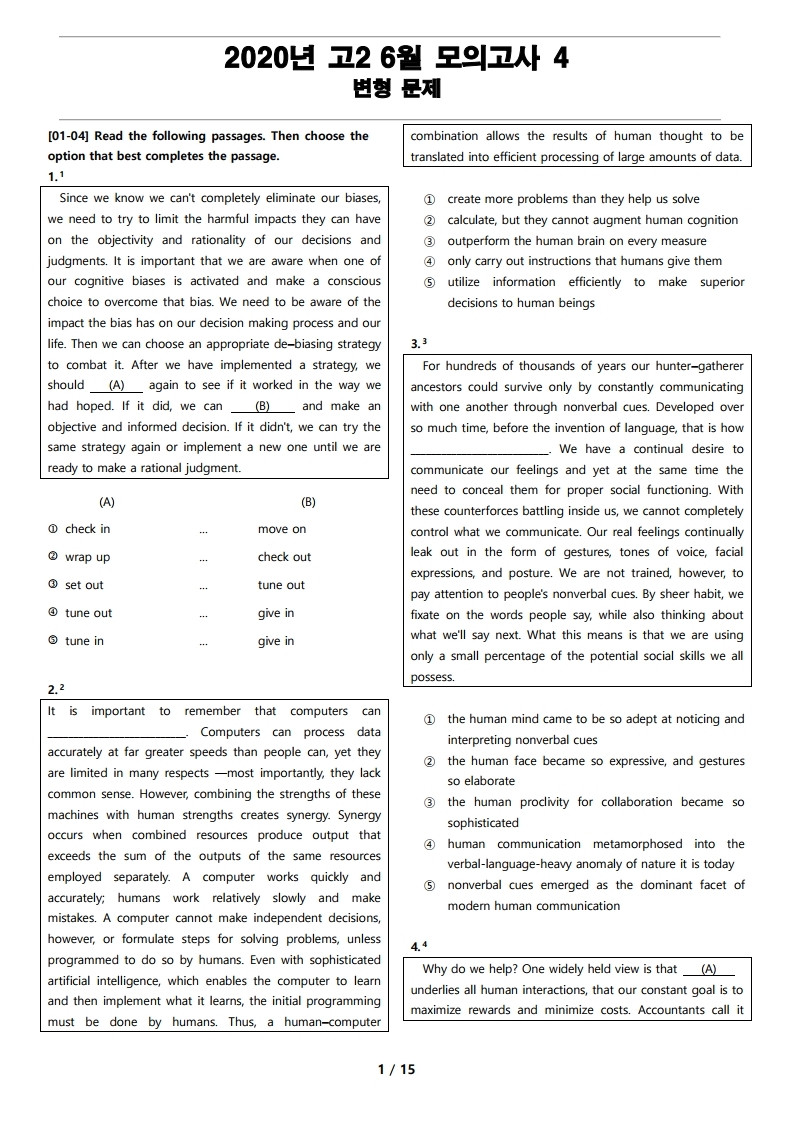2020년 고2 6월 전국 연합 모의고사
변형 문제 4

일반 워크북 형태의 문제에서 벗어나 The Makings가 만든
2020년 고2 6월 전국 연합 모의고사 변형 문제 4
출판사에서 오랫동안 영어 번역과 교정을 하셨던 원어민 선생님과
현직에서 강사를 하고 있는 연구진들이 학생들을 위한
최상의 2020년 고2 6월 전국 연합 모의고사 변형 문제 4 을 선보입니다.
사고력과 이해력을 요구하는 문제들로 내신 대비 뿐만이 아니라
수능도 한꺼번에 공부하실 수 있는 자료입니다.
중간고사&기말고사 전에 더메이킹스(The Makings)에서 제작한
2020년 고2 6월 전국 연합 모의고사 변형 문제로 마무리 하세요.
정답 확인하러가기!
http://themakings.co.kr/64/?idx=381
2020년 고2 6월 전국 연합 모의고사 변형 문제 4
2020년 고2 6월 전국 연합 모의고사 변형 문제, 내신대비, 영어내신자료,고등영어자료, 모의고사 변형문제,전국 연합모의고사 변형자료, 모의고사 영어 서술형 대비
themakings.co.kr
themakings.co.kr

The Makings의 2020년 고2 6월 전국 연합 모의고사 변형 문제는
총 11개의 유형으로 구성되어 있습니다.
1. 빈칸 채우기(객관식)
2. 글의 내용 일치/불일치(객관식/한글 선택지)
3. 글의 내용 일치/불일치(객관식/영어 선택지)
4. 글 끼어 넣기(객관식)
5. 어법(서술형)
6. 어휘(서술형)
7. 주제문(객관식/영어 선택지)
8. 어휘 빈칸 채우기(서술형)
9. 영작(서술형)
10. 요약문 완성하기(서술형)
11. 문단 재배열 하기(객관식)
더메이킹스(The Makings)가 제작한 2020년 고2
6월 전국 연합 모의고사 변형 문제 4의 지문입니다.
1번 지문(문항 번호 37번)
Since we know we can't completely eliminate our biases, we need to try to limit the harmful impacts they can have on the objectivity and rationality of our decisions and judgments. It is important that we are aware when one of our cognitive biases is activated and make a conscious choice to overcome that bias. We need to be aware of the impact the bias has on our decision making process and our life. Then we can choose an appropriate de‒biasing strategy to combat it. After we have implemented a strategy, we should check in again to see if it worked in the way we had hoped. If it did, we can move on and make an objective and informed decision. If it didn't, we can try the same strategy again or implement a new one until we are ready to make a rational judgment.
2번 지문(문항 번호 38번)
It is important to remember that computers can only carry out instructions that humans give them. Computers can process data accurately at far greater speeds than people can, yet they are limited in many respects ―most importantly, they lack common sense. However, combining the strengths of these machines with human strengths creates synergy. Synergy occurs when combined resources produce output that exceeds the sum of the outputs of the same resources employed separately. A computer works quickly and accurately; humans work relatively slowly and make mistakes. A computer cannot make independent decisions, however, or formulate steps for solving problems, unless programmed to do so by humans. Even with sophisticated artificial intelligence, which enables the computer to learn and then implement what it learns, the initial programming must be done by humans. Thus, a human‒computer combination allows the results of human thought to be translated into efficient processing of large amounts of data.
3번 지문(문항 번호 39번)
For hundreds of thousands of years our hunter‒gatherer ancestors could survive only by constantly communicating with one another through nonverbal cues. Developed over so much time, before the invention of language, that is how the human face became so expressive, and gestures so elaborate. We have a continual desire to communicate our feelings and yet at the same time the need to conceal them for proper social functioning. With these counterforces battling inside us, we cannot completely control what we communicate. Our real feelings continually leak out in the form of gestures, tones of voice, facial expressions, and posture. We are not trained, however, to pay attention to people's nonverbal cues. By sheer habit, we fixate on the words people say, while also thinking about what we'll say next. What this means is that we are using only a small percentage of the potential social skills we all possess.
4번 지문(문항 번호 40번)
Why do we help? One widely held view is that self‒interest underlies all human interactions, that our constant goal is to maximize rewards and minimize costs. Accountants call it cost‒benefit analysis. Philosophers call it utilitarianism. Social psychologists call it social exchange theory. If you are considering whether to donate blood, you may weigh the costs of doing so (time, discomfort, and anxiety) against the benefits (reduced guilt, social approval, and good feelings). If the rewards exceed the costs, you will help. Others believe that we help because we have been socialized to do so, through norms that prescribe how we ought to behave. Through socialization, we learn the reciprocity norm: the expectation that we should return help, not harm, to those who have helped us. In our relations with others of similar status, the reciprocity norm compels us to give (in favors, gifts, or social invitations) about as much as we receive.
'전국 연합 모의고사 변형 문제 > 고2 모의고사 변형 문제' 카테고리의 다른 글
| 2020년 고2 9월 전국 연합 모의고사변형 문제 2 (0) | 2020.09.28 |
|---|---|
| 2020년 고2 전국 연합 모의고사 영어 변형문제 1 (0) | 2020.09.26 |
| 2020년 고2 6월 전국 연합 모의고사 변형 문제 3 (0) | 2020.07.23 |
| 2020년 고2 6월 전국 연합 모의고사변형 문제 1 (0) | 2020.07.22 |
| 2020년 고2 6월 전국 연합 모의고사변형 문제 2 (0) | 2020.07.17 |